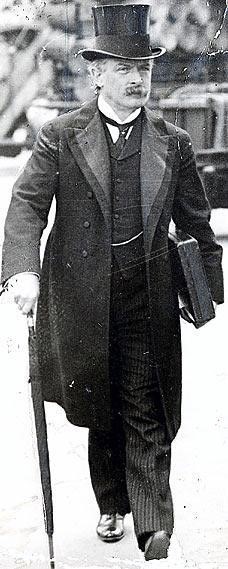How to Handle Rivals – Report of Meeting Between Damian Collins and Tim Bouverie
Author and historian Richard R. O’Brien reports on the recent meeting between Damian Collins and Tim Bouverie.


During the 14-17th May Fleet Street Quarter Festival of Words, Damian Collins, author of Rivals in the Storm: How Lloyd George Seized Power, Won the War and Lost his Government, (pictured left) a highly readable, informative and effective assessment of Lloyd George’s premiership, was in conversation, as is now the fashion, with Tim Bouverie (pictured right) on the latter’s new book Allies at War: The Politics of Defeating Hitler.
Tim Bouverie’s presentation was structured on Churchill’s handling of his personal wartime allies/rivals, Stalin, de Gaulle, and Roosevelt, relationships that already had some barriers to overcome: Churchill’s long expressed dislike of the “Bolsheviks”, but firm in the belief that Germany had to be surrounded to be defeated; de Gaulle’s tenuous claim to represent the defeated France – the youngest ever French brigadier -general but the only senior French military man available to symbolise French resistance in the face of charges of collaboration and capitulation; and American reservations as to how far they wanted to support a country hanging onto its protectionist anachronistic British Empire which still hadn’t repaid its first world war debts. Hence in the postwar settlement, arrangements such as Bretton Woods were more favourable to Russia, seen by the US as a rather closed economy, not as a commercial rival, and to whom there was a significant blood debt to be repaid.
Discussion teased out interesting comparisons in the way that the British war leaders, both mavericks, and both unique in taking office whilst not leaders of their own political party, succeeded in their mission to win the war: Lloyd George taking munitions production by the scruff of the neck, before becoming Prime Minister; Churchill’s own finest hour being when taking the moral lead in standing up to Hitler. Both had their own challenges in dealing with their respective military commanders.
Tim Bouverie gave particular attention to one man whose career spanned both leaders, Philip Kerr, Lloyd George’s former Private Secretary, very active during the Versailles Treaty, who later, as Lord Lothian, supported Chamberlain’s “Munich” agreement before becoming disillusioned with Hitler and, as Ambassador to the USA, proving very effective in enlisting American support for economic aid.
In discussion as to how history has judged the two leaders, Tim Bouverie noted that whilst both were great and persuasive orators, Churchill’s carefully crafted punchier phrases and speeches have been long remembered, whilst few would be able to quote from Lloyd George’s spontaneous addresses, despite their power and effectiveness at the time.
